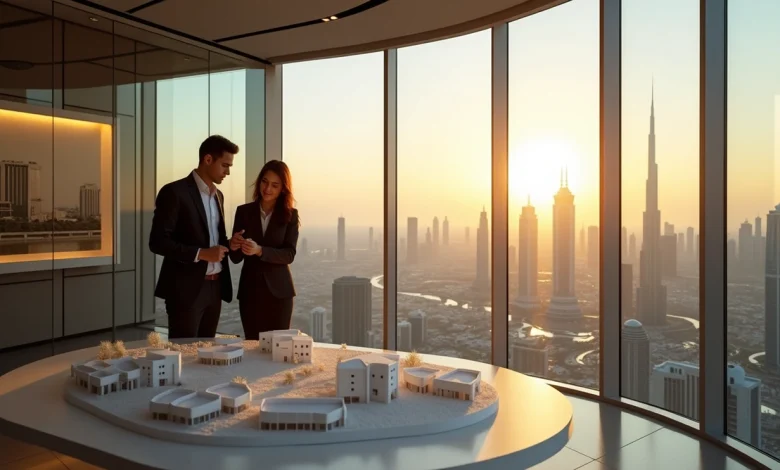
Easy Finance Fuels Dubai’s $24.5bn Off-Plan Property Market Surge
Dubai’s off-plan real estate sales have hit $24.5bn this year as investors flock to high returns and easy financing options. These sales make up 38% of the total market. The market shows impressive momentum with 40,500 off-plan property transactions between January and May 15, 2023. The sector has grown at an unprecedented rate, and off-plan transactions now represent about 63% of all property sales in 2024, up from 54% in 2023.
Dubai’s property market appeal is obvious to investors. The city’s developments offer rental returns up to 7%, which makes real estate an attractive investment choice. Developer incentives drive off-plan sales through extended payment plans that stretch up to seven years. Market fundamentals support this growth, and total residential sales transactions jumped 40.3% to 170,992 units in 2024 – more than five times the number from 2020.
Developers Offer Incentives to Attract Off-Plan Buyers
Image Source: Eon & Trisl
“Flexible payment plans and investor-friendly regulations continue to drive off-plan sales.” — Steven Leckie, Dubai real estate analyst and commentator
Dubai’s property developers now roll out new incentive packages that attract investors to the off-plan market. Market competition and supply pressure have made these incentives standard features in Dubai’s real estate world in the last 24 months.
Flexible payment options are the life-blood of these strategies. Developers now offer extended post-handover payment plans that stretch up to seven years. Buyers can start with just a 5% original down payment and spread remaining costs throughout the construction period. To cite an instance, Nakheel’s Al Furjan villas and townhouses need just a 5% deposit with payments spread across seven years.
Additionally, developers provide substantial financial relief through Dubai Land Department (DLD) fee waivers. Buyers save 4% of the property purchase price plus an AED 580 administration fee. Major developers like Emaar, Damac, Sobha, Nakheel, Azizi, Danube, Binghatti, and Meraas offer these waivers on selected projects.
Guaranteed rental returns have become a powerful incentive, especially in the luxury segment. Returns range from 3% to 10% of the property’s sale price over periods spanning 3 to 10 years. SLS Tower offers 7% guaranteed returns for 10 years, and Radisson Damac Hills provides 10% guaranteed returns for 3 years.
Developers partner with financial institutions to ease buyer entry into the market. Azizi Developments created a novel approach by working with two banks—one finances the initial deposit while another funds the remaining mortgage.
Buyers can access these attractive incentives:
- Discounts of up to 20% on property prices
- Service charge waivers for initial years
- Zero commission on direct developer purchases
- Exclusive club memberships
These incentives match Dubai Land Department standards that require developers to provide transparent information on registered projects while offering exclusive benefits for international investors. Competition intensifies, and investors in Dubai can expect creative incentives that stimulate the off-plan property market.
Limited Supply in Ready Market Pushes Buyers to Off-Plan
Image Source: Kelt and Co Realty
Dubai’s real estate market faces a major lack of ready properties. This shortage pushes buyers to look at off-plan options. The luxury segment feels this pinch even more, as fäm Properties reports show very few high-end properties will enter the market in coming years.
Numbers from DXBinteract reveal only 16,500 units under construction belong to luxury or ultra-luxury segments, with prices from AED 5 million to AED 60 million plus. Buyers should note that 72% of these luxury projects are still in early stages, showing just 0-20% completion progress.
The villa market faces the toughest squeeze. Knight Frank expects only 19,700 new villas to be ready by 2025’s end. People just need more family-friendly homes, which has pushed villa prices up 26% in 2024.
The supply crunch gets worse because:
- About 30% of projects face delays each year
- Prime locations have few available plots
- Available properties dropped 30% while prime listings fell 52%
- Villas make up only 17.4% of new builds through 2029
These shortages hit prime areas hard. Palm Jumeirah and Dubai Hills now have vacancy rates below 5%. Premium business areas like DIFC are packed, with 98% occupancy. This squeeze drives competition up, leading to 16% higher rents and 18% growth in sales prices year-on-year.
Dubai plans to deliver over 300,000 homes by 2029. Yet population growth means the city needs 37,600 to 87,700 new homes yearly by 2040. This gap between supply and demand keeps pushing investors toward off-plan options. They’re willing to wait for delivery to secure their spot in the market.
The tight ready market creates a cycle that boosts off-plan sales. Investors see pre-construction purchases as their best way into Dubai’s competitive property market.
Luxury Segment and HNWI Migration Fuel Market Momentum
Image Source: DXB Interact
“Are we witnessing the most globally diversified property boom in Dubai’s history?” — Steven Leckie, Dubai real estate analyst and commentator
High-net-worth individuals (HNWIs) moving to Dubai have become a key driver of the emirate’s thriving off-plan market. The UAE will just need to welcome over 6,700 millionaires in 2024—more than any other country worldwide. This wealth influx has revolutionized the luxury real estate world, especially when you have branded residences.
Buyers strongly prefer branded residences, with sales jumping 43% in 2024 as more than 13,000 units found new owners. Wealthy buyers gladly pay up to 69% more per square foot for these properties compared to non-branded options in similar locations. This price difference expresses the global elite’s growing desire for exclusivity.
The luxury market has shown remarkable growth in the last decade. Properties valued above AED 15 million have seen an incredible 688% increase since 2015, reaching AED 71 billion in 2024. Ultra-luxury developments across Dubai continue to attract international investors who seek better lifestyles and want to preserve their capital.
The lack of high-end inventory propels market growth significantly. From roughly 326,000 properties under construction, only 16,500 units qualify as luxury or ultra-luxury. Most of these developments remain at early stages, with just 0-20% completion progress.
Wealth has concentrated in specific areas:
- Palm Jumeirah saw 35 transactions worth AED 1.4 billion
- Emirates Hills recorded 19 deals reaching AED 1.3 billion
Dubai now houses over 81,200 millionaires, 237 centimillionaires, and 20 billionaires. UHNWI numbers should rise 30% by 2028. These wealthy individuals choose Dubai because it offers:
- Political and economic stability
- Strategic tax advantages
- Strong infrastructure (ranked fourth globally)
- Better value compared to other global cities
- Flexible residency options
Dubai has surpassed traditional luxury markets like London and New York for two straight years in sales of homes above AED 36.72 million. This success strengthens its position among global wealth hubs.
Dubai’s Off-Plan Market Outlook: Sustained Growth Ahead
Dubai’s off-plan property market shows incredible momentum right now. Transactions have hit $24.5 billion and make up 63% of all property sales in 2024. This growth comes from several connected factors. Rental yields of up to 7% keep attracting global investors who want strong returns. Developer incentives like extended payment plans and DLD fee waivers have made it easier for buyers to enter the market.
Ready market inventory remains limited, especially in the luxury segment. This pushes more investors toward pre-construction opportunities. The villa segment faces tough supply constraints. Only 19,700 new villas will be ready by late 2025, while demand keeps rising. Buyers now see off-plan purchases as their best option to secure properties in prime locations.
High-net-worth individuals keep reshaping market dynamics. The UAE will welcome 6,700 millionaires in 2024 alone, which drives up demand for premium properties. Luxury segment sales have grown dramatically – properties above AED 15 million have seen a 688% increase since 2015.
Some analysts question if this growth can last, but the market’s core drivers remain solid. Dubai’s prime location, reliable infrastructure, tax benefits, and better value compared to other global cities support its real estate growth. The off-plan market looks set for steady expansion in the coming years, and Dubai continues to strengthen its position as a leading global real estate hub.






